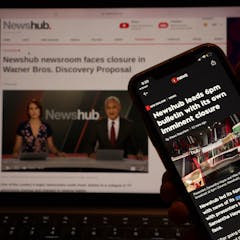
Artikel-artikel mengenai Google
Menampilkan 1 - 20 dari 623 artikel

Unlike the risks from AI’s capabilities, the economic risks from new technologies are knowable and can be mitigated

From an economic development perspective, the highly skewed nature of AI activity in the US is likely to create large pools of high-skilled workers in some regions while leaving other regions behind.

Four Ontario school boards have filed a lawsuit against social media platforms to force them to change practices that harm schoolchildren.

Quantum computing has huge promise from a technical perspective, but the practical benefits are less clear.

Artificial intelligence promises revolutionary solutions to global challenges, but the water costs to produce and power AI hardware and infrastructure may exceed the benefits.

Online extremism is a unique challenge – terrorists use methods that can’t be captured by standard content moderation. So, what can we do about it?

Calls for the Fair News Digital Bargaining Bill to be fast-tracked are misguided. A better solution would be a straight levy on digital advertising to fund public interest news production.

The lack of large, global European tech leaders might actually be a blessing.

What is the meaning of the recent release of Google Gemini and where it stands regarding the fast developments of AI technology and its foreseen impacts.

Meta’s announcement it will stop paying for news poses a threat. High-quality news is expensive, but important. Do we need economic measures that somehow get the public to pay for it?

If there is an overriding theme in The Worlds I See, it is that human and artificial intelligence form a double helix.

Governments around the world keep filing antitrust lawsuits against the ‘big four’ tech companies. Here’s why that matters for everyone who uses their products.

While the current version of Gemini isn’t mind blowing, later iterations are likely to be much more powerful.

Learning about the world from live events is the next step for AI.

It’s the fourth most popular website in the world, but our new study shows toxic commentary can still thrive on Wikipedia. There’s a lot at stake if too many editors are driven away.

Social media platforms are abandoning news – which is bad news for traditional media organisations that have come to rely on them for consumers.

The padlock symbol simply means that the data being sent between the web server and the user’s computer is encrypted and cannot be read by others. But many people don’t know that.

Our research is the first to estimate what the tech giants owe publishers. The actual sums paid out are usually covered by non-disclosure agreements.

Search engines run by generative AI could fundamentally change the online ecosystem.

Google is paving the way to serve you ads based directly on your browsing history, instead of cookies.
